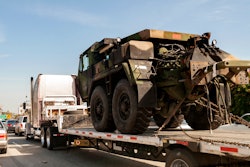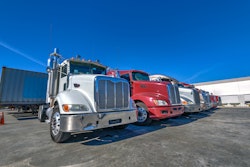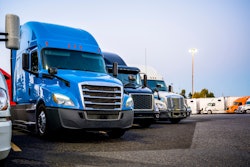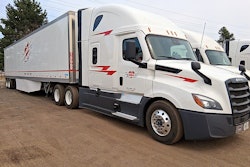Members of Cowan Systems upper management, including (L-R) Norman Mitchell, Wayne Zdenek, Joe Cowan, Reid Eikner and Dennis Morgan, have more than 125 years of trucking experience.
When Joe Cowan wants to make a point about his business strategy, he contrasts his situation to that of Schneider National. “They buy pencils cheaper than we do,” Cowan tells his staff at Baltimore-based Cowan Systems, which operates 750 trucks. In other words, the huge carriers enjoy power and economies that dwarf those of smaller would-be competitors.
It’s a comment Cowan repeats often to remind his people that while Cowan Systems may be far larger than the average trucking company, it still must find success through sound business strategy, not sheer size.
Cowan founded Cowan Systems in 1994, but the company has roots that go back to 1924, when his father established W.T. Cowan, Inc. as a less-than-truckload service in the Mid-Atlantic states. The current company, though, is a far cry from his father’s business. Cowan Systems thrives on dedicated hauls, and Cowan has focused his business on being the dominant force in smaller markets where industry giants like Schneider don’t have a large presence.
“I don’t want to go into a market to do routes that are longer than 250 miles,” Cowan says. “Schneider can do that.”
Competing at any level in the trucking industry is challenging, but when a company tries to go toe to toe with the top carriers, it must find some way to differentiate its services, Cowan says. So he chooses markets where Cowan System’s 750 trucks make it the big fish. By remaining largely a regional hauler with dedicated routes, Cowan Systems doesn’t have to directly compete with large, over-the-road, irregular-route carriers. But Cowan Systems still has the economies of scale to trump smaller players. The result has been an annual growth rate of more than 20 percent even during tough market conditions.
“We are comfortable with this business strategy and operating model,” Cowan says. “There are 40 million people living between Richmond, Va. and Boston. There’s plenty of exposure there.”
Cowan Systems possesses one of the keys to success in a regional strategy – management personnel with decades of trucking experience. That gives the carrier a leg up competing for business in smaller cities. “We end up competing with parochial fleets for freight,” Cowan says. “I’m in a local environment.”
The senior staff has a combined 125 years in truckload and less-than-truckload experience. “We’ve done it every way known,” says Norman Mitchell, a Cowan Systems vice president.
As Mitchell suggests, many of Cowan Systems’ executives learned from trial and error, and fortunately most of that came at other carriers. The same is true for Cowan, although his education did come within the family business. His father’s trucking company evolved into a large irregular route carrier by the late 1980s and early 1990s. The carrier, Keyway Transport, was struggling to compete in the “you call, we haul” business of over-the-road freight.
“Credit was abundant,” Cowan says. “Tractor suppliers were financing anybody.”
Joe Cowan eventually sold the company because the fierce competition made profit hard to come by. When he started Cowan Systems in 1994, Cowan went with a different approach – focus on those areas where he could be the most competitive. “Define an operating territory and stay inside of it,” Cowan says. “Don’t do Oregon. Know your territory.”
Cowan founded the new company around regional, dedicated freight where asset utilization can be maximized. For the new venture, dedicated freight was more predictable, less of a commodity and more profitable. The focus on local and regional routes made things easier, too – the company was familiar with the areas to which it hauled, and Cowan Systems could promise drivers home time.
And the regional focus was a good move strategically. One success story is Cowan System’s relationship with Coca Cola. The carrier hauls beverages and raw materials for the international conglomerate year-round, but during the summer the beverage market takes off. When beverage sales spike during the hot summer months, Cowan systems can meet that demand without adding trucks and drivers it will shed when the season ends. “Beverage sales may surge as much as 30 percent in May,” Cowan says.
The carrier uses an in-house brokerage to help move extra freight while maintaining its core focus. Cowan Systems generally brokers freight that either it can’t haul or is out of pattern. But it uses the brokerage business only to serve the carrier’s customers. As brokered loads grow, the company expands its fleet and adds new business to eliminate the need to broker. “One way we differentiate ourselves from these smaller fleets is our ability to broker freight,” Cowan says. “As we expand we trim what we broker.”
Low maintenance, high service
Cowan Systems recognizes its core competencies. Sales and operations are among them; maintenance is not. Truck dealers in the cities where Cowan Systems does the bulk of its business perform all of its preventive maintenance and warranty work. The carrier trades power units every 36 to 48 months. The average tractor age is around two years, and none of the fleet’s 1,400 trailers is older than five years. The company believes its cost per mile for maintenance is below that of fleets that maintain their own shops.
Mitchell says this approach allows his company to focus on what it does best and eliminates the headaches of hiring and training technicians. “So far we’ve been very successful with outsourcing,” Mitchell says.
The carrier also has succeeded in adding services that its customers need and which further differentiate Cowan Systems from its competitors. For example, the company offers air cargo and expedited freight services to its customers, making Cowan Systems attractive to manufacturers and suppliers interested more in “one-stop” service.
Cowan Systems also offers a driver leasing service to customers that have their own private fleets. That small part of the business – the service typically has about 50 drivers in it – is an outgrowth of Cowan’s own meticulous hiring process.
“Our hiring standards are above industry standard,” Mitchell declares. “When a driver falls below those standards, they are disqualified.” Cowan doesn’t share its criteria publicly, but Mitchell says the hiring process involves a number of objective and subjective standards that allow managers to base their decisions on a risk assessment.
Because the company offers good pay and benefits, no-touch freight and frequent home time, turnover averages only around 30 percent. The company also attracts a wide array of driver applicants with its pay and benefits package, so replacing the ones that leave isn’t difficult.
Those applicants who fail to meet its strict hiring guidelines because they have too many moving violations, accidents or fail to meet the grade for other reasons, end up in the pool that Cowan leases to other carriers and clients. Those drivers are still DOT-qualified and are an added service the company can offer to its clients.
The company also excels in managing costs. Its building, which is in an industrial area near railheads and the Baltimore-Washington International Airport, is small and simple. Even the company president has a cubicle. While Cowan Systems may never be able to realize the savings Schneider National achieves through market power, it is ever vigilant about managing costs and trying to become the power buyer within its own market.










